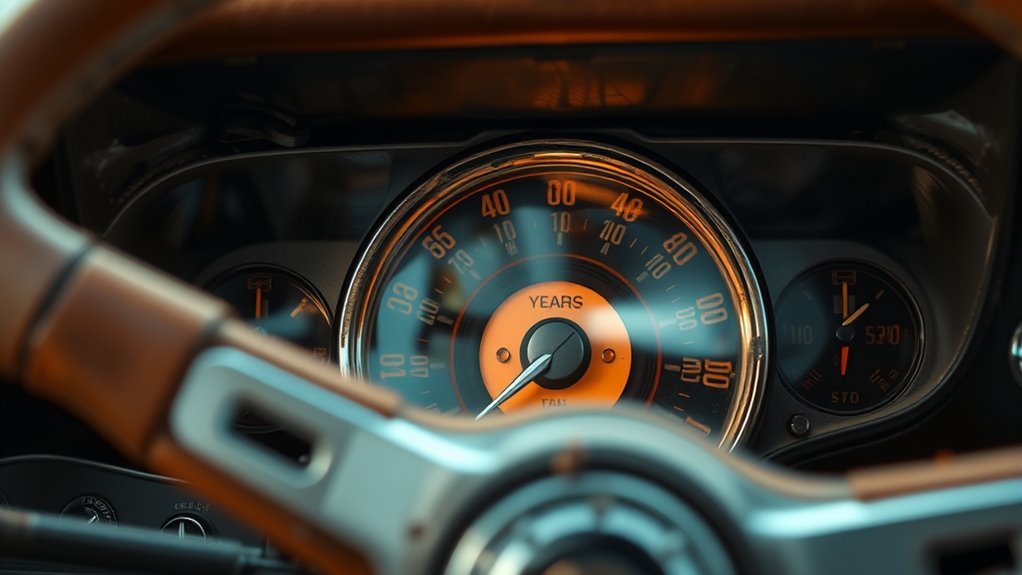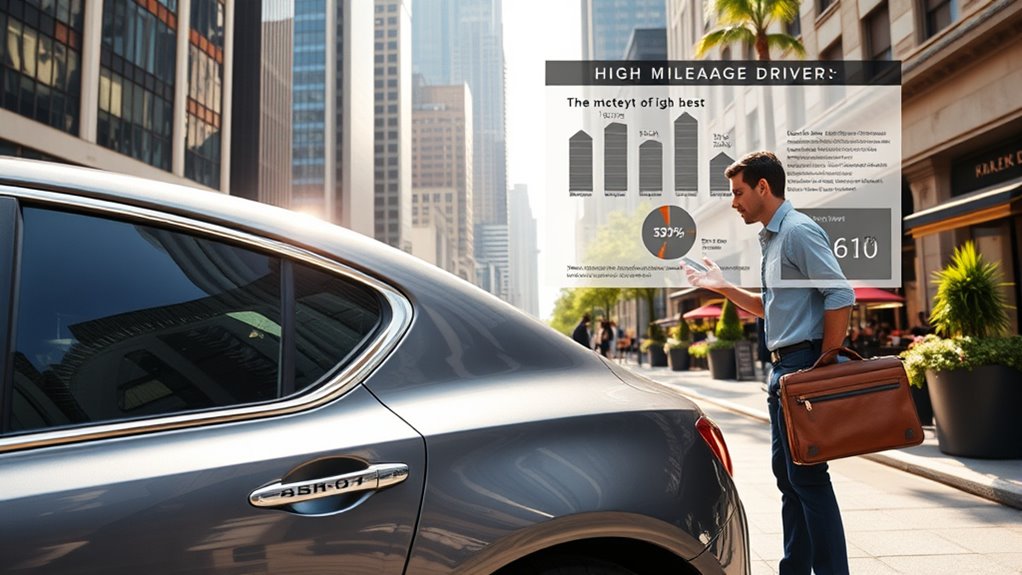High-mileage drivers often rely on sticker MPG ratings, but these numbers can be misleading in real life. Factors like traffic, loads, and weather influence actual fuel efficiency and wear on your vehicle. Proper maintenance and choosing durable models help lower long-term costs. To truly understand your expenses, consider how technology and maintenance impact your driving. Keep going, and you’ll uncover insights to make smarter, more economical high-mileage choices.
Key Takeaways
- MPG ratings often overestimate real-world fuel efficiency for high-mileage drivers due to variable driving conditions.
- Regular vehicle maintenance is vital to sustain performance, reduce repair costs, and improve longevity for high-mileage use.
- Choosing durable, reliable vehicles upfront can lower long-term expenses despite higher initial costs.
- Technological features enhance efficiency and durability, making high-mileage driving more economical and less stressful.
- Total driving costs include maintenance, repairs, and vehicle choice, not just fuel economy ratings.

Have you ever believed that a car’s advertised miles per gallon is the ultimate measure of its efficiency? It’s a common assumption, but the truth is, focusing solely on fuel efficiency can be misleading. While high MPG figures are attractive, they don’t tell the whole story—especially if you’re a high-mileage driver. When you rack up thousands of miles annually, other factors come into play, and understanding these can save you both money and frustration.
First, consider fuel efficiency beyond just the numbers on the window sticker. Even if your vehicle boasts impressive MPG ratings, real-world conditions can cause those numbers to fluctuate. Frequent stop-and-go traffic, heavy loads, and climate variations can all impact your actual fuel economy. But more importantly, high-mileage drivers often face increased maintenance costs that can outweigh fuel savings. Over time, the wear and tear on your engine, transmission, brakes, and tires add up, making maintenance a vital part of your overall expenses.
Real-world driving conditions and maintenance costs matter more than MPG ratings for high-mileage drivers.
Keeping your vehicle well-maintained is essential if you’re hitting high mileage. Regular oil changes, tire rotations, and brake inspections aren’t just routine—they’re investments in your car’s longevity and efficiency. When neglected, these costs escalate quickly, forcing you to spend more on repairs or replacements down the line. Furthermore, a poorly maintained vehicle consumes more fuel, decreasing your fuel efficiency and increasing your fuel expenses, which counters any initial savings from high MPG ratings.
As a high-mileage driver, you should also consider the long-term durability of your vehicle. Some models are designed to withstand extensive use better than others. Investing in a reliable, well-built car might cost more upfront but can considerably reduce your maintenance costs over time. Additionally, staying on top of preventive maintenance helps avoid costly repairs that could sideline your driving plans and drain your budget.
Another important aspect is understanding the role of technology in improving your vehicle’s efficiency and durability. Modern advancements such as DLP and LCD projectors, along with calibration and contrast ratio considerations, exemplify how technology can enhance performance and longevity. Similarly, investing in vehicles equipped with the latest tech can help you maximize your high-mileage driving experience.
In essence, when you’re driving frequently, it’s vital to look beyond just fuel efficiency. Focus on maintaining your vehicle properly and choosing models known for their durability. This approach ensures that your high-mileage lifestyle remains economical and stress-free. Remember, the true cost of driving isn’t just about how many miles per gallon you get; it’s about managing those miles smartly through good maintenance practices and realistic expectations. Ultimately, understanding the bigger picture can help you make more informed decisions and keep your vehicle running smoothly for years to come.
Frequently Asked Questions
How Does Vehicle Maintenance Impact High-Mileage Vehicle Value?
Vehicle maintenance markedly impacts high-mileage vehicle value because consistent upkeep reduces maintenance costs over time and prevents costly repairs. Proper maintenance helps slow resale depreciation, keeping your vehicle in better condition and more attractive to buyers. When you invest in regular service, you demonstrate good care, which can boost resale value. Conversely, neglecting maintenance can lead to higher costs and faster depreciation, making your vehicle less appealing when it’s time to sell.
Are High-Mileage Vehicles More Environmentally Friendly Than Newer Models?
You might think high-mileage vehicles are more eco-friendly, but that’s not always true. While they can have better engine longevity, they often emit more eco-friendly emissions due to aging parts and less advanced technology. Newer models typically feature cleaner engines and better fuel efficiency, reducing overall environmental impact. So, despite their durability, high-mileage vehicles usually aren’t more environmentally friendly than newer models with advanced emission controls.
What Financial Benefits Come From Driving a High-Mileage Car?
Driving a high-mileage car can save you money through better fuel efficiency, as older models often have optimized engines. Additionally, depreciation rates tend to slow down once a vehicle reaches higher mileage, meaning your car retains more value longer. This can reduce your overall costs when it’s time to sell. So, you benefit from lower fuel expenses and potentially higher resale value, making high-mileage driving a smart financial choice.
How Do Insurance Premiums Vary for High-Mileage Drivers?
Insurance premiums for high-mileage drivers can feel like riding a roller coaster—fluctuating based on your driving habits. Typically, your insurance rates may increase because more miles mean more risk in the eyes of insurers. Premium adjustments often reflect this, with some companies charging higher rates for extensive driving. However, safe driving and shopping around can help you find better insurance rates, even if you log a lot of miles.
Can High Mileage Affect Resale Value Differently Across Car Brands?
High mileage can impact resale value differently based on the car brand’s reputation. If you drive a brand known for durability, your car may experience less resale depreciation, even at high mileage. Conversely, brands with a reputation for quicker wear and tear could see sharper value drops. You should consider how your brand’s reputation influences resale value, especially if high mileage is inevitable.
Conclusion
Don’t let the high-mileage myth fool you. Your car’s true worth isn’t measured by how many miles it’s traveled but by how well you’ve maintained it. With proper care, a high-mileage vehicle can be as reliable as the day you bought it—maybe even more so. So, trust your maintenance routine and don’t let numbers drain your confidence. Your car’s endurance is a demonstration of your dedication, proving that with the right effort, anything is possible.










